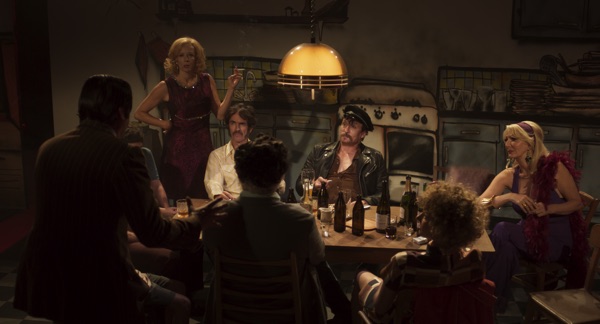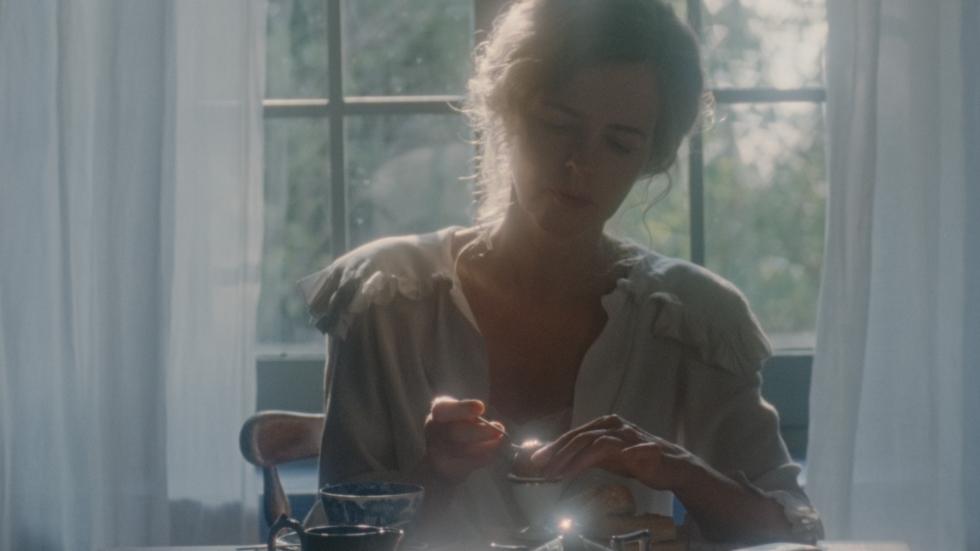‘Enfant Terrible' and 'Karen', two of the films programmed this year by the SEFF, explore the lives of filmmaker R.W. Fassbinder and writer Karen Blixen. In connection with their screening, we remind you of nine other biopics produced in Europe and presented previously at the SEFF.
This year at the Seville European Film Festival, we will be presenting two biopics involving celebrated artists. First, in the recently created Extraordinary Stories: Special Screen Selection section, the Festival features Enfant Terrible. Directed by Oskar Roehler (Atomised), and endorsed by the Cannes Label, a far from complacent approach to the turbulent life of the German film master, Rainer Werner Fassbinder. An extravagant and cranky character, explosive and tortured, wild and self-destructive, who died prematurely at 37, leaving behind about thirty feature films (some as iconic as The Bitter Tears of Petra von Kant, The Marriage of Maria Braun and Querelle).

Enfant Terrible Enfant Terrible shares the spotlight, in this case in the Official Section, with another biographical approach to an artist: Karen, the second feature film by María Pérez Sanz (Malpartida Fluxus Village), which focuses on the last period spent in Kenya by the writer Karen Blixen, better known as Isak Dinesen, who belongs to the cinematic imagination thanks to her Memories of Africa. Christina Rosenvinge brings this character to life on this delicate film with literary, but also historical references to colonialism as a backdrop. In honor of these two films, we invite you to discover nine other biopics about prominent artists which have been screened at our festival.
‘Variações’ (João Maia, 2019, Portugal)
Showcased at last year's SEFF, this Portuguese production delves into the life and professional career of António Joaquim Rodrigues Ribeiro, better known as António Variações. A multifaceted singer and gay icon of the 80s, who mixed rock, pop, blues and fado like no one else. The film travels from the artist's childhood to his adventures abroad, returning to Portugal to sing in native language, highlighting also his fight against AIDS. A key figure in the music scene in Portugal.
‘Leto’ (Kirill Serébrennikov, 2018, Russia-France)
This Russian production -with French participation- takes us to a key period in the underground rock music scene in Leningrad, at the beginning of the 80s, and during the Soviet regime. This energetic and rebellious film, focuses on the figure of Viktor Tsoi, while recording the first album of the influential band Kinó, led by Tsoi himself. The film escapes from any conventionality to rather focus on the biopic aspect of it, showing the turmoil that the USSR was going through on a social-political level at a time of great change. Leto visited the SEFF in 2018.
‘Dovlatov’ (Alexei German Jr., 2018, Russia-Poland-Serbia)
A week in the life of Russian writer Sergey Dovlátov, one of the most important voices in Russian literature from the second half of the 20th century. Sharp, acid, rebellious, and judgemental about communism, that is how Dovlátov is, only wishing to write and have his texts published. However, neither the magazine in which he works nor the rigid writers' union make it easy for him. On top of that, his marriage is in a turning point. His figure is the focus of this biopic-like-film, with which Alexei German Jr. portrays the Soviet Union in the mid 1970s, an unfriendly place for freedom. Winner of the Artistic Contribution Award at the Berlinale, also screened at the Seville Festival in 2018.
‘Barbara' (Mathieu Amalric, 2017, France)
The list of winners at the 2017 Seville Film Festival included an award for best director to Mathieu Amalric for this approach to the figure of the iconic French singer Barbara, which had already won the Un Certain Regard section at the Cannes Film Festival. Far from the conventional biopic standards, the film is constructed as a fascinating and somewhat chaotic game of metalinguistic mirrors in which the singer merges with the actress who plays her, Jeanne Balibar.
‘Nico, 1988’ (Susanna Nicchiarelli, 2017, Italy-Belgium)
In 2017, Seville welcomed another biographical approach to a singer: in this case the famous Nico, model and vocalist of The Velvet Underground, muse of Andy Warhol and member of his Factory, as well as the romantic partner of Alain Delon, with whom he had a son, and lover of Dylan and Hendrix. The film, which won the Orizzonti section at the Venice Film Festival, tries to get closer to Christa Päffgen (that was her real name), the person who was hiding behind Nico, focusing on a vital moment in which she wants to break with her past, to abandon the image that was held of her. A debut feature by the Italian Susanna Nicchiarelli, who relied on the Danish Trine Drynholm (Festen) to play the main character.
‘England is Mine’ (Mark Gill, 2017, Great Britain)
In 2017, at an edition especially permeable to biopics in Seville. The debutant Marc Gill paid tribute to the mythical, Stephen Patrick Morrissey, singer of The Smiths. England is Mine focuses on the path Morrissey followed to find his own sound and how he lead a band that made history. The film also focuses on his relationship with his friend Linder Sterling, an artist known for her feminist contributions to the Manchester punk scene in the 80s.
‘Mr. Turner’ (Mike Leigh, 2014, Great Britain, France, Germany, USA)
Mike Leigh and his legendary actor Timothy Spall join forces once again in this journey through the last 25 years of the life of the eccentric and notorious British painter J.M.W. Turner. Rather than giving biographical references on Turner's artistic style, Leigh turns Mr. Turner into what is perhaps his most visually compelling film, aided by the photography of Dick Pope. Leigh and Spall were recognized by the Seville European Film Festival in 2014 by winning the awards for Best Director and Best Actor (which Spall also won in Cannes).
‘Saint Laurent’ (Bertrand Bonello, 2014, France-Belgium)
More than just portraying the life of a fashion icon like Yves Saint Laurent, Bertrand Bonello enters the head of this design artist with an anti-biopic film. Delivering his own vision on the character, excessive and hypnotic, confronting the man with his work and, above all, with the significance that his name took on, transcending his own work. Gaspard Ulliel embodies the most famous tailor in the world (so much so that in the same year another biopic was shot, in a much more conventional way and far less interesting) in a film that was shown at the SEFF in 2014.
‘Camille Claudel 1915’ (Bruno Dumont, 2013, Francia)
Uno de los cineastas habituales en Sevilla es Bruno Dumont. En la sección de 2013 presentó un acercamiento muy particular, radical y ascético, a la figura de la escultora Camille Claudel. Internada por su familia en un psiquiátrico, espera la visita de su hermano. De tempo lento y contemplativo, el film es una muestra de hiperrealismo llevado al límite, con actores no profesionales que eran enfermos psíquicos reales, con los que tuvo que convivir la protagonista, una estelar Juliette Binoche. Curiosidad: fue el primer largometraje de Dumont estrenado comercialmente en España.
‘Camille Claudel 1915’ (Bruno Dumont, 2013, Francia)
One of the filmmakers that became a regular in Seville is Bruno Dumont. In the 2013 edition, he presented a very particular, radical and ascetic approach to the figure of the sculptor Camille Claudel. Admitted by her family to a psychiatric hospital, she awaits a visit from her brother. Slow and contemplative, the film is a display of hyperrealism taken to the limit, with non-professional actors who were real psychiatric patients, with whom the protagonist, Juliette Binoche, had to live. Fun-Fact: It was Dumont's first feature film to be released commercially in Spain.







